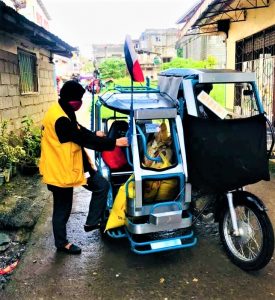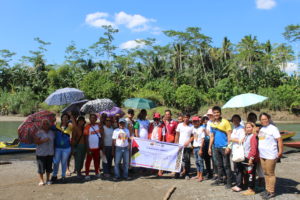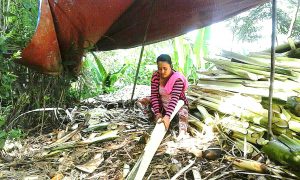This unprecedented situation – the rise of coronavirus cases shocked the world. This changed the entire population’s day-to-day activities. This also carries the inevitable impact to all services provided, repositioning the world to an entire paradigm shift.
Leaders all over the world mandated policies and protocols which put up limitations and constraints that even coping with the social and economic environment is difficult. One unavoidable effect seen with the constraints implemented is the slow movement of goods and the drop of transportation services and activities.
In the Philippine context, public and mass transports are suspended especially during the enhanced community quarantine phase or those under modified lockdown. Many have lost revenues and adjusted their business operations. In the long run, even informal economy workers including drivers of jeepneys, motorcycles, tricycles and bicycle-cabs are at risk and mostly vulnerable in terms of financial impact.
However, researches show that one of the solutions to mitigate the risks and overcome the impact of COVID-19 is to heighten the advantages of transportation.
Through this, it will enable to continue the operations of transport services that could support them financially such as delivery of basic human essentials, goods and services of businesses. It can also be utilized for mobility of passengers and workers on the front line such as the health workers and professionals, social and humanitarian workers and volunteers especially for those in high-risk urban and rural areas. Even under cautious measures of physical distancing and lockdown measures, the demands for transport services both on the frontlines and in its traditional movement is highly needed.
On War and Health Crisis
When the outbreak between the ISIS-inspired Maute Group and military men happened in Marawi City last May 23, 2017, thousands of people evacuated and most of them have lost their properties and livelihood and shifted their mindset towards that traumatic situation.
Millions of people all over the world witnessed the outcry of the Islamic City. Organizations and agencies in different places poured their all-out support, assistance and compassion for the recovery and rehabilitation processes of the city.
ECOWEB also responded and implemented different projects strengthening the survivor and community-led response which empowers the locals affected by the crisis to decide and lead their own processes of recovery and survival.
One of the projects implemented was “Support to Peacebuilding and Normalization – Welfare Assistance to Vulnerable Sector” or SPAN –WAVE which was initiated by the Office of the Presidential Advisers on the Peace Process (OPAPP) and United Nations Development Programme (UNDP).
98 barangays from the province of Lanao del Sur, Maguindanao, Basilan, Sulu and Tawi-Tawi were selected as beneficiaries of the program. Basically, the program was implemented with five components such as peace building projects, alternative dispute resolution, culture of peace, health care service and social enterprise management.
ECOWEB partnered with ten local civil society organizations and seven barangays in Marawi City namely Barangay Mipaga, Gadongan, Emie Punud, Buadi Sacayo, East Basak, Biabadamag and Basak Malutlut.
As part of the social enterprise management component, partner barangays are given the opportunity to submit their social enterprise proposals which can help alleviate their communities’ situations especially on the normalization process of Marawi. A total amount of 400,000 pesos was given to each barangay’s project.
One of the target areas which is barangay Basak Malutlut has addressed their problem on having an increased pay on transportation fares which students and workers in the barangay cannot afford. On their proposal, it was indicated that since most of the barangay’s constituents do not have sustained income since their return, they would want that their money will be spent on their daily consumption rather than pay transportation costs.
The identification of the social enterprise project was based on the realities happening in the community. The Malutlut People Livelihood Producer Cooperative initiated the “BM Transporation Services” which already launched during the first quarter of the year. This is a high-demand project specifically to the barangay as they will also implement a low-rate fare most especially to persons with disabilities, senior citizens and students and other transportation services that are not yet met among other public utility vehicle services in Marawi.
During the turn-over, the cooperative received five motorcycle with side cabs, five motor tool set and support for acquisition of legal requirements such as registration, taxes and permits. The beneficiaries of the project were carefully evaluated through thorough assessment of economic capacity of every household and identification of household vulnerabilities was also considered.
With this global coronavirus pandemic, internally displaced individual of Marawi City has also experienced another battle from their initial recovery and now has to cry more for help in terms of financial support and relief goods. For months since the modified lockdown in the city, the transport services of the group has not been functional and income of those low-to-none-privileged members were on hold due to the suspension of mass transportation.
Meanwhile, one of the objectives of their social enterprise is to fund programs and events for education, economical livelihood and community projects while helping the vulnerable families of their group to both sustain the enterprise and the cooperative itself.
This makes it harder for the members of the group to adjust on situations like that of the war and now with the health emergency, where cases are increasing day to day.
The Unsung Heroes
As terrible as both crisis experienced by affected communities, they even brought their practical side and gave their best strategies to still cope up from the situation.
Despite the restrictions, operators of the five motor-cabs have paved their way to move forward and use the enterprise to a whole new level. Aside from using the cabs of getting regular passengers, in which the total income of fares earned in a day cannot suffice their daily consumption, they also use it to transport goods and being able to tap small businesses for delivery of goods or for bulk transport.
Now, with this COVID-19 crisis, operators and drivers are most effective on their work to be one of the agents of mobility, and as frontliners in service.
Through the guidance and support of Hon. Norhaya L. Grande, chairperson of the barangay, the drivers were transitioned into becoming community mobilizers. They were rented and paid fairly on their services such as being the main service of frontliners like the barangay health workers, social workers and peace action staffs, community leaders and volunteers. They even used this means to work in coordination with the barangay to mobilize the peace action team in terms of distributing home quarantine passes, relief goods and stood up as motor-patrols in some checkpoints and during curfew hours.
“Hindi kami magsasawang magbigay ng serbisyo sa aming barangay lalo na ngayong may COVID. Lalo na sa mga nabigyan ng motorsiklo, nakatulong ito sa pang araw-araw nilang pangangailangan at nakatulong din sila sa lahat ng aming kasamahan na frontliners at sa mga residente. Sila ay tinuturing naming bayani sa pakikiisa nila sa ating laban ngayon. Sana ay madagdagan pa ang kanilang kita at mananatili ang kanilang pagsisilbi sa aming barangay.” said Grande in a phone interview.
 [We will not stop in providing services in our barangay especially now with the COVID-19 outbreak. For those who received the motorcycles, this will help them on their daily needs and they also helped all our fellow frontliners and residents. We also consider them as our heroes in their solidarity with our battle against this health crisis. We hope that their income will increase and also continue to serve the barangay.]
[We will not stop in providing services in our barangay especially now with the COVID-19 outbreak. For those who received the motorcycles, this will help them on their daily needs and they also helped all our fellow frontliners and residents. We also consider them as our heroes in their solidarity with our battle against this health crisis. We hope that their income will increase and also continue to serve the barangay.]
Recently, each motor-cab was used to deliver five sacks of rice from the provincial government to five houses simultaneously. They were even asked to transport some frontliners not just in the barangay but also in the city and provincial office with an income that can now suffice not just their daily consumption but also with other essential needs.
Generally, with the voluntary efforts by these selected individuals, they are contributing initiatives and acts to support the programs of barangay Basak Malutlut which includes being mobilized for frontliners in monitoring of persons under investigation, locally-stranded individuals and returning oversees Filipino worker, transportation services in case of emergencies, transportation for the BPATs during their patrol, assistance when there are announcements for faster dissemination of notice such as outreach programs, relief operation and the like, and assistance during relief operations for carrying the goods received. Meanwhile, the barangay assured that they are fully secured and safe from their travels.
During this time of crisis, they are the people who also deserve acknowledgment and recognition as they stood up to become the unsung heroes on the frontline with so much responsibility on hand bringing services and support to the people and the entire community.
With the risks and dangers of the virus that they might face in a daily-basis, they are still ready to be an essential function in the society that even in their small ways; they give light and contribution in fighting this pandemic.



![Read more about the article Fuerte de la Concepcion y del Triunfo or Fort of the [Immaculate] Conception and of the Triumph [of the Cross]](https://ecowebph.org/wp-content/uploads/2008/07/123123-1-300x222.jpg)




